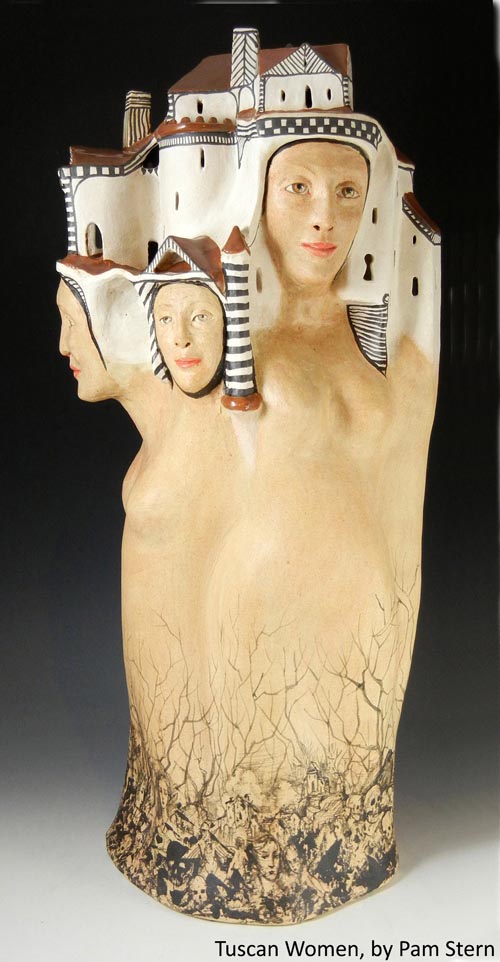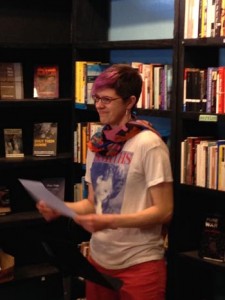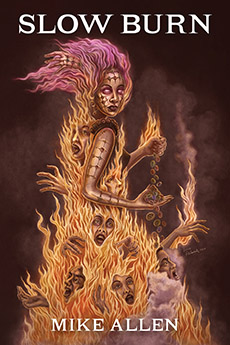Featured Story • June 2016
We Will Hold
Alisa Alering
The world contracts, and with a single push, we slip from between our mother’s thighs. We clench together in a knot, our limbs coiled and twined like the grooves in a walnut’s shell. The midwife squeezes her fingers between our slippery limbs and prizes us apart.
Our mother frets because she has only two breasts, and we have five crying mouths. But as milk flows into the mouth of one sister, the rest of us begin to grow like slowly inflating balloons. She wraps us in skins of fresh linen and puts us to bed in five separate cots. We dream of the pink light on the horizon. In the morning, our cots are drawn together in the middle of the room like beans thrown into a bowl.
We toddle hand in hand on fat legs, and a current buzzes between us, prickling our fingers like the lick of a caterpillar’s spines. Our tender wisps of hair grow into ringlets. When we lie in the clover, heads together, our hair unpins. The strands creep from our bonnets and braid together into a tent that shades our eyes from the yolk-yellow sun. We brush the grass from our skirts and walk through the forest to school. The ribbons on our white pinafores reach out and tangle together like the spokes of a spider’s web.
“Those children are unnatural,” the priest tells our mother. “It would be best for everyone if they were drowned.”
We rumble, we tremor. A blister erupts below the surface but we hold it in, paper it over with fresh skin. Our mother hugs us close. We run out to the orchard and teach ourselves to fly. When it is my turn, I stand on the ground, and my sisters climb the tree above me. They wrap their arms around the trunk and hold on tight. I am drawn towards them. Up, up—first my hair, then my dress, then my feet. I float in the air among them, snapping cherries off the branch with my teeth.
Calloused hands pinch my waist and shove me into a sack.
“Got one!” It is the voice of a man. The tree shakes, and we are plucked from its branches. We struggle; we see only rough cloth. We call to each other over the men’s voices. And then the water. The river is high from the storms, and strange things bump against us. Broken wheels, forlorn shoes, dented teapots, the charred hind leg of a donkey; telltale souvenirs of war upstream. The current drags us under. Our sacks bob together and then smash away amid the rocks. Head down I tumble, churned by the current. I can no longer sense my sisters. My mouth opens, and the river flows in.
“Spit it out!” my sisters cry as they haul me onto the bank and tear open the sack. They take turns sitting on my chest until the swallowed river leaps back into the world. I cough and splutter, and then I breathe. But we know—we can feel—that water still lodges inside of me, a sharp bubble like a liquid pearl.
We shake, we seethe. We spread our hair in the sun to dry. The villagers have only their laws and fears. They have not lain tangled in their sisters’ thoughts and felt wrapped around with love. They cannot harm us, but we worry for them. We worry for our mother.
We are soothing our throats with licorice tea in our mother’s courtyard when the Swarm bursts out of the land from the direction of the western sun. We feel them move across the countryside, smashing village after village, sweeping the plains clean like a broom of blades. The faceless men on nameless beasts explode into our village. They plunge between us, and we scatter. When it is over, their shouts echo to the east as they thunder away. They will return.
We rise from our hiding places. Our bare feet track in the blood of our neighbors as we come back together. Our village is in ruins. Our mother is dead. All crumbles into anonymous dust. Only the bookseller’s shop, the granary, and our mother’s house remain. We kneel, we grieve.
“This is your fault,” the priest says, emerging from beneath his desecrated altar.
His mother must have fed him grass, his father beat him with a strap. He is a lonely stick. What is a tattered robe and a list of commands to sisters’ love?
We crawl through ash and bones. We crouch under the wrecked foundations, ducking our heads, huddled back to back. My sisters square their shoulders beneath the bookseller’s and the granary. I place my head under our mother’s house. We pull together and curl into our remembered knot, twisting and twining our limbs to enclose our core, round like a walnut shell.
“We are a seed,” my sisters say. “But what will make us grow?”
My sisters squeeze their arms and legs and hair around me. My ribs are splintering, my chest is bursting, something is splitting me right in the center. A hard pellet erupts from my lungs, spouts up my throat and out my clenched jaw, forcing it open. The bubble of swallowed water shoots into the air and drops back onto us. The river water trickles down and wets our limbs.
We feel it first in our toes—the cracking as the first bones break. Our toes stretch and spread. Our feet grow out and down. We five hold hands and, shoulder-to-shoulder, rise out of the ashes. The buildings will tip, but we will hold them fast. We will lift and lift and raise the remaining buildings into the sky.
We are a tower. We are safety. We are sisters. We will hold our village up above the plains, high above the Swarm.
The first refugee will put his foot on the ladder and begin to climb.

 Alisa Alering was hatched in a secret hollow in the Appalachian mountains of Pennsylvania, where she ran around barefoot and talked to the trees. She now lives in Indiana, though she remains fond of moss, mushrooms, and mulberries. Her short fiction has appeared in Clockwork Phoenix 4, Podcastle, and Flash Fiction Online, among other publications. To her regret, she does not have any sisters. Follow her at alering.com and @alering.
Alisa Alering was hatched in a secret hollow in the Appalachian mountains of Pennsylvania, where she ran around barefoot and talked to the trees. She now lives in Indiana, though she remains fond of moss, mushrooms, and mulberries. Her short fiction has appeared in Clockwork Phoenix 4, Podcastle, and Flash Fiction Online, among other publications. To her regret, she does not have any sisters. Follow her at alering.com and @alering.
She tells us that “‘We Will Hold’ was originally written for Bonnie Jo Stufflebeam’s ‘Art & Words’ show in Forth Worth in 2014, and a version was performed live during the show. Per the ‘Art & Words’ theme, the story was inspired by the sculpture Tuscan Women by artist Pam Stern.” (The sculpture is pictured above.)
![]()
If you’ve enjoyed what you’ve read, please consider pitching in to keep us going. Your donation goes toward future content.
![]()















